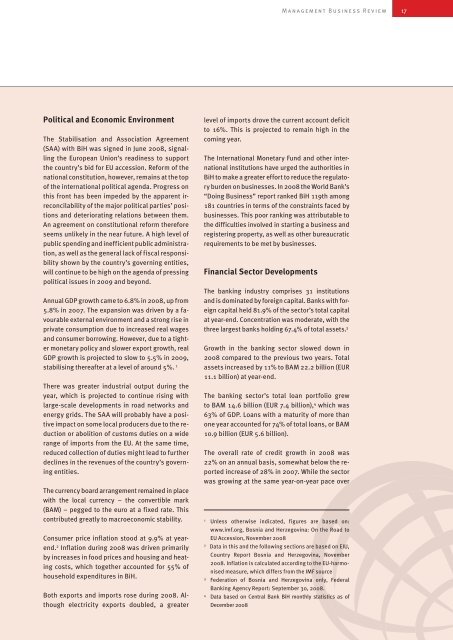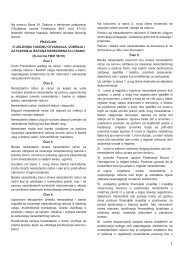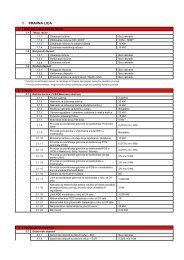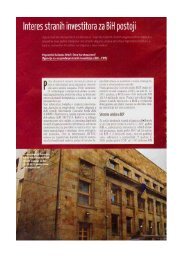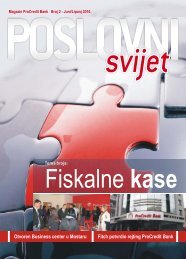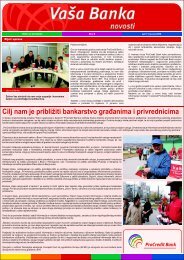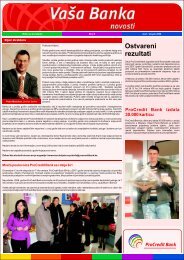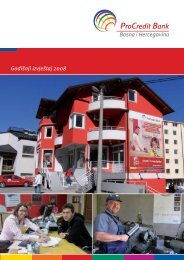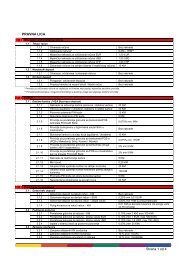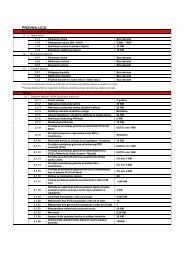Annual Report 2008 - ProCredit Bank
Annual Report 2008 - ProCredit Bank
Annual Report 2008 - ProCredit Bank
Create successful ePaper yourself
Turn your PDF publications into a flip-book with our unique Google optimized e-Paper software.
Management Business Review 17<br />
Political and Economic Environment<br />
The Stabilisation and Association Agreement<br />
(SAA) with BiH was signed in June <strong>2008</strong>, signalling<br />
the European Union’s readiness to support<br />
the country’s bid for EU accession. Reform of the<br />
national constitution, however, remains at the top<br />
of the international political agenda. Progress on<br />
this front has been impeded by the apparent irreconcilability<br />
of the major political parties’ positions<br />
and deteriorating relations between them.<br />
An agreement on constitutional reform therefore<br />
seems unlikely in the near future. A high level of<br />
public spending and inefficient public administration,<br />
as well as the general lack of fiscal responsibility<br />
shown by the country’s governing entities,<br />
will continue to be high on the agenda of pressing<br />
political issues in 2009 and beyond.<br />
<strong>Annual</strong> GDP growth came to 6.8% in <strong>2008</strong>, up from<br />
5.8% in 2007. The expansion was driven by a favourable<br />
external environment and a strong rise in<br />
private consumption due to increased real wages<br />
and consumer borrowing. However, due to a tighter<br />
monetary policy and slower export growth, real<br />
GDP growth is projected to slow to 5.5% in 2009,<br />
stabilising thereafter at a level of around 5%. 1<br />
There was greater industrial output during the<br />
year, which is projected to continue rising with<br />
large-scale developments in road networks and<br />
energy grids. The SAA will probably have a positive<br />
impact on some local producers due to the reduction<br />
or abolition of customs duties on a wide<br />
range of imports from the EU. At the same time,<br />
reduced collection of duties might lead to further<br />
declines in the revenues of the country’s governing<br />
entities.<br />
The currency board arrangement remained in place<br />
with the local currency – the convertible mark<br />
(BAM) – pegged to the euro at a fixed rate. This<br />
contributed greatly to macroeconomic stability.<br />
Consumer price inflation stood at 9.9% at yearend.<br />
2 Inflation during <strong>2008</strong> was driven primarily<br />
by increases in food prices and housing and heating<br />
costs, which together accounted for 55% of<br />
household expenditures in BiH.<br />
Both exports and imports rose during <strong>2008</strong>. Although<br />
electricity exports doubled, a greater<br />
level of imports drove the current account deficit<br />
to 16%. This is projected to remain high in the<br />
coming year.<br />
The International Monetary Fund and other international<br />
institutions have urged the authorities in<br />
BiH to make a greater effort to reduce the regulatory<br />
burden on businesses. In <strong>2008</strong> the World <strong>Bank</strong>’s<br />
“Doing Business” report ranked BiH 119th among<br />
181 countries in terms of the constraints faced by<br />
businesses. This poor ranking was attributable to<br />
the difficulties involved in starting a business and<br />
registering property, as well as other bureaucratic<br />
requirements to be met by businesses.<br />
Financial Sector Developments<br />
The banking industry comprises 31 institutions<br />
and is dominated by foreign capital. <strong>Bank</strong>s with foreign<br />
capital held 81.9% of the sector’s total capital<br />
at year-end. Concentration was moderate, with the<br />
three largest banks holding 67.4% of total assets. 3<br />
Growth in the banking sector slowed down in<br />
<strong>2008</strong> compared to the previous two years. Total<br />
assets increased by 11% to BAM 22.2 billion (EUR<br />
11.1 billion) at year-end.<br />
The banking sector’s total loan portfolio grew<br />
to BAM 14.6 billion (EUR 7.4 billion), 4 which was<br />
63% of GDP. Loans with a maturity of more than<br />
one year accounted for 74% of total loans, or BAM<br />
10.9 billion (EUR 5.6 billion).<br />
The overall rate of credit growth in <strong>2008</strong> was<br />
22% on an annual basis, somewhat below the reported<br />
increase of 28% in 2007. While the sector<br />
was growing at the same year-on-year pace over<br />
1<br />
Unless otherwise indicated, figures are based on:<br />
www.imf.org, Bosnia and Herzegovina: On the Road to<br />
EU Accession, November <strong>2008</strong><br />
2<br />
Data in this and the following sections are based on EIU,<br />
Country <strong>Report</strong> Bosnia and Herzegovina, November<br />
<strong>2008</strong>. Inflation is calculated according to the EU-harmonised<br />
measure, which differs from the IMF source<br />
3<br />
Federation of Bosnia and Herzegovina only, Federal<br />
<strong>Bank</strong>ing Agency <strong>Report</strong>: September 30, <strong>2008</strong>.<br />
4<br />
Data based on Central <strong>Bank</strong> BiH monthly statistics as of<br />
December <strong>2008</strong>


